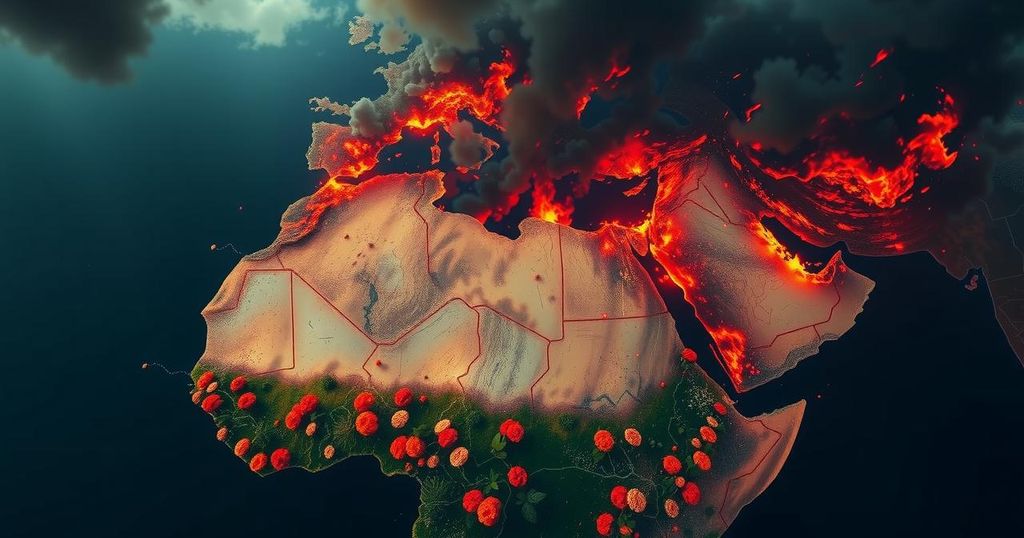Tensions are resurfacing in the Horn of Africa, particularly in Ethiopia, where a fragile peace remains after the Tigray conflict. Prime Minister Abiy Ahmed’s pursuit of Red Sea access is aggravating relations with neighboring Somalia, while Egypt and other states are seeking leverage. With various conflicts in the region, including Sudan’s civil war and Somalia’s instability, urgent U.S. intervention is necessary to prevent further conflict escalation.
In light of the impending U.S. presidential elections, the Horn of Africa is once again facing escalating unrest. The turbulence originated from Ethiopia, which has experienced a series of conflicts primarily between the central government and the Tigray region since November 2020. Despite the cessation of hostilities in 2022 bringing some respite, faults remain unhealed, particularly concerning the resettlement of displaced persons. Furthermore, the coalition initially formed by Prime Minister Abiy Ahmed to quell the Tigrayan crisis has splintered, inciting ongoing civil tensions within the regions of Amhara and Oromia. As the United States navigates a tightly contested electoral atmosphere, the critical dynamics in the Horn of Africa could easily be dismissed. The Ethiopian government’s strategic focus on establishing access to the Red Sea evokes considerable concern among its neighbors. Notably, Prime Minister Abiy’s pursuit of negotiations with Somaliland to secure maritime routes has inadvertently exacerbated Ethiopia’s historically strained relations with Somalia. In response to these developments, Egypt, which remains apprehensive regarding the Grand Ethiopian Renaissance Dam’s ramifications on the Nile, seeks to consolidate alliances, notably by supplying military aid to Somalia. Meanwhile, Eritrea has engaged in dialogues with both Egypt and Somalia, underlining its penchant for fostering regional weaknesses among its neighbors. Non-African powers with vested interests in the Red Sea and Gulf of Aden are actively pursuing their agendas. Turkey has revitalized its connections with Somalia, while the United Arab Emirates continues to maintain its ties with Abiy Ahmed. The intricate complexities of the region, combined with longstanding disputes, create a precarious environment prone to conflict escalation. Such a scenario would primarily inflict devastation upon African populations, with broader implications for global trade routes as vital shipping lanes may become jeopardized. Additionally, increasing refugee movements will impose tremendous burdens on host nations, rendering the situation in the Horn of Africa a matter of international significance. With existing humanitarian crises demanding urgent attention, particularly the dire civil war in Sudan and rampant instability in Somalia—where groups such as al-Shabaab remain active and potentially link with Yemen’s Houthi rebels—the international community cannot afford to allow further deterioration of stability in the region. Thus, the United States must take immediate and decisive action to alleviate tensions, curb proxy confrontations, and avert an escalation into widespread calamity.
The Horn of Africa has historically been a complex geopolitical landscape characterized by ethnic conflicts, regional rivalries, and international interests. Since November 2020, Ethiopia’s conflict with the Tigray region has drawn significant attention due to its humanitarian implications and the potential for spillover into neighboring countries. The cessation of hostilities in 2022 was a significant development, yet numerous unresolved issues linger, such as the return of displaced individuals. The region remains a focal point for both African and non-African powers, each vying for influence over strategic waterways and local governance.
In summary, the Horn of Africa is once again at a critical juncture, with rising tensions posing significant risks not only to regional stability but also to global security and economic flows. As various actors, both regional and international, jockey for influence, it is crucial for the United States to take a proactive role in mediating disputes and promoting peace in the region. Neglecting these issues could lead to devastating humanitarian crises and destabilization that would resonate beyond Africa’s borders.
Original Source: www.cfr.org






